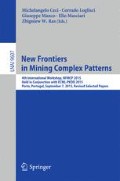Abstract
Analogy is the cognitive process of matching the characterizing features of two different items. This may enable reuse of knowledge across domains, which can be helpful to solve problems. Analogy is strongly related to semantics, because the mappings are based on the role and meaning of the features, which goes beyond simple syntactic association. The analogical mappings found between pairs of descriptions can be used to obtain more general analogical patterns. Such patterns may be stored in the long term memory, allowing self-improvement and growth. This paper proposes generalizations of patterns obtained by analogy, carried out through two main steps: (1) isolating analogous roles of two descriptions coming from different domains, and (2) abstracting from portions of knowledge that have no analogical relationships. The result is a multi-strategy approach in which the analogy brings to a generalization, that is, in turn, a novel description to reason over and over again. An example is provided to show the behavior and effect of the proposed generalization approach.
Access this chapter
Tax calculation will be finalised at checkout
Purchases are for personal use only
Notes
- 1.
This connectionist approach to constraint satisfaction was investigated in [16].
References
Doumas, L.A.A., Hummel, J.E., Sandhofer, C.M.: A theory of the discovery and predication of relational concepts. Psychol. Rev. 115(1), 1–43 (2008)
Falkenhainer, B., Forbus, K.D., Gentner, D.: The structure-mapping engine: algorithm and examples. Artif. Intell. 41, 1–63 (1989)
Gentner, D.: Analogy. In: A Companion to Cognitive Science, pp. 107–113 (1998)
Gentner, D., Markman, A.B.: Structure mapping in analogy and similarity. Am. Psychol. 52, 45–56 (1997)
Gick, M.L., Holyoak, K.J.: Analogical problem solving. Cogn. Psychol. 12(3), 306–355 (1980)
Giordana, A., Saitta, L., Roverso, D.: Abstracting concepts with inverse resolution. In: 8th International Workshop on Machine Learning, pp. 142–146 (1991)
Hofstadter, D.R., Mitchell, M.: The copycat project: a model of mental fluidity and analogy-making. In: Advances in Connectionist and Neural Computation Theory. Ablex Publishing Corporation, Norwood (1994)
Holyoak, K.J., Hummel, J.E.: The proper treatment of symbols in a connectionist architecture. In: Dietrich, E., Markman, A. (eds.) Cognitive Dynamics: Conceptual and Representational Change in Humans and Machines. Lawrence Erlbaum Associates, Mahwah (2000)
Holyoak, K.J., Hummel, J.E.: Understanding analogy within a biological symbol system. In: Holyoak, K.J., Gentner, D., Konikov, B.N. (eds.) The Analogical Mind, pp. 161–195. The MIT Press, Cambridge (2001)
Holyoak, K.J., Thagard, P.: Analogical mapping by constraint satisfaction. Cogn. Sci. 13, 295–355 (1989)
Hummel, J.E., Holyoak, K.J.: Distributed representations of structure: a theory of analogical access and mapping. Psychol. Rev. 104(3), 427–466 (1997)
Leuzzi, F., Ferilli, S.: Reasoning by analogy using past experiences. In: Proceedings of the 28th Italian Conference on Computational Logic (CILC 2013), vol. 1068, pp. 115–129. CEUR-WS.org (2013)
Lloyd, J.W.: Foundations of Logic Programming, 2nd edn. Springer, Heidelberg (1987)
Hongjing, L., Chen, D., Holyoak, K.J.: Bayesian analogy with relational tansformations. Psychol. Rev. 119(3), 617–648 (2012)
Michalski, R.S.: Inferential theory of learning: developing foundations for multistrategy learning. In: Machine Learning: A Multi-strategy Approach, vol. 4, pp. 3–62. Morgan Kaufmann Publishers (1993)
Rumelhart, D.E., Smolensky, P., McClelland, J.L., Hinton, G.E.: Schemata and sequential thought processes in PDP models. In: Parallel Distributed Processing, pp. 7–57. MIT Press, Cambridge (1986)
Wilson, W.H., Halford, G.S., Gray, B., Phillips, S.: The star-2 model for mapping hierarchically structured analogs. In: The Analogical Mind, pp. 125–159 (2001)
Author information
Authors and Affiliations
Corresponding author
Editor information
Editors and Affiliations
Rights and permissions
Copyright information
© 2016 Springer International Publishing Switzerland
About this paper
Cite this paper
Leuzzi, F., Ferilli, S. (2016). Generalizing Patterns for Cross-Domain Analogy. In: Ceci, M., Loglisci, C., Manco, G., Masciari, E., Ras, Z. (eds) New Frontiers in Mining Complex Patterns. NFMCP 2015. Lecture Notes in Computer Science(), vol 9607. Springer, Cham. https://doi.org/10.1007/978-3-319-39315-5_10
Download citation
DOI: https://doi.org/10.1007/978-3-319-39315-5_10
Published:
Publisher Name: Springer, Cham
Print ISBN: 978-3-319-39314-8
Online ISBN: 978-3-319-39315-5
eBook Packages: Computer ScienceComputer Science (R0)

